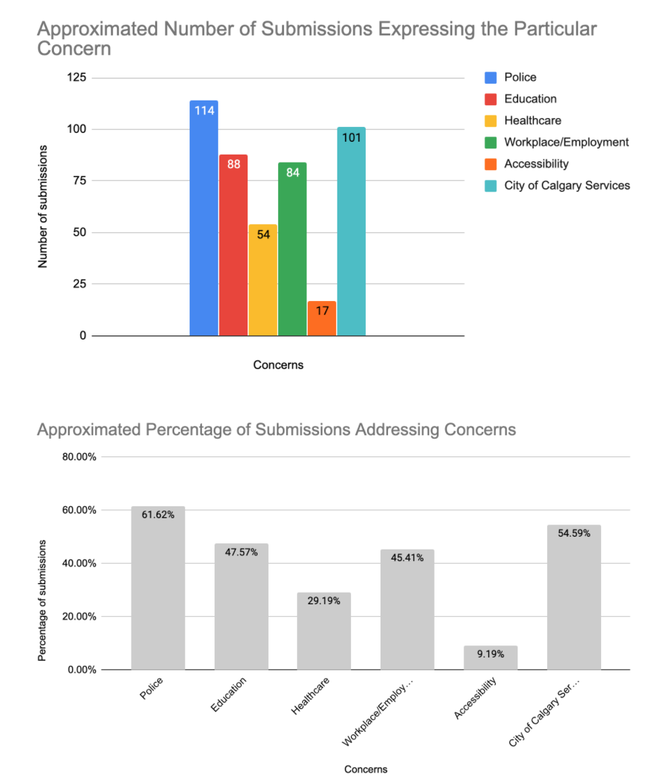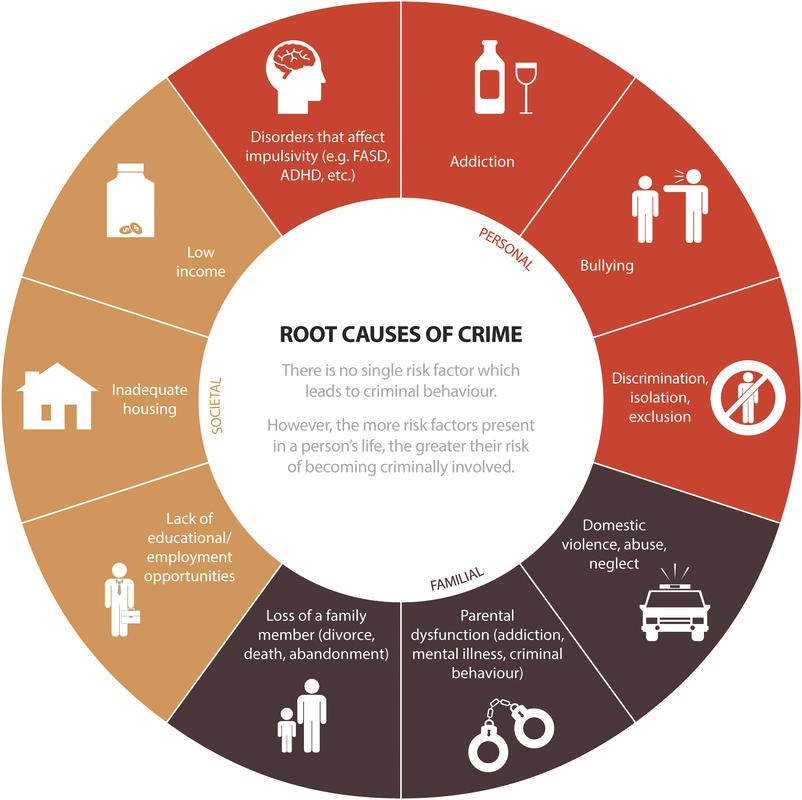|
His Worship Mayor Naheed Nenshi and The City of Calgary Councillors, Thank you for hosting the public hearing on systemic racism on July 7 - 9, 2020. Although discussing racism is often uncomfortable, painful and re-traumatizing, we greatly appreciate the attention paid to this critical conversation and are awaiting the next steps. Our team watched the recording of the hearing, in addition the livestream, and went through the written submissions to provide you with data based on the speakers’ stories. Please note these are initial estimates based on both the livestream and written submissions. In the graph below, the number represents the total number of people who stated their concerns during their presentation, as well as the percentage of times the concerns were mentioned. As illustrated in the graphs above, an overwhelming number of participants had concerns about systemic racism in the Calgary Police Service. There were also specific key issues mentioned within each broad concern, including:
Sincerely, Canadian Cultural Mosaic Foundation
0 Comments
Did you know that Calgary police officers shot and killed more people in 2018 than any other city in Canada? Alarmingly, this was also more than in either Chicago or New York, the two largest police departments in the US.
This is not just an American problem. This past week, Calgary City Council heard from over 150 Black, Indigenous and people of colour (BIPOC) who detailed countless incidents of abuse, mistreatment and discrimination at the hands of Calgary police. The trauma caused by law enforcement was undeniable on their faces and in their voices as they courageously shared their stories in hopes of meaningful change. Above the Law is a new documentary on CBC that examines three cases of police violence in Calgary. The film clearly illustrates how Calgary Police have both taken and ruined the lives of so many Calgarians. This has a wide-reaching impact on not just their loved ones, but their communities as well. We know that police brutality disproportionately impacts the BIPOC community. Yet, Calgary police are not mandated to collect race-based data which significantly limits their accountability. Their budget is nearly 10 times that of social services and affordable housing combined, despite the fact that these types of programs are proven to address the root causes of crime more effectively and humanely. It’s also more cost-effective, enabling your tax dollars to be reallocated to other important services. Of the 15,963 contacts with the public recorded by Calgary police in 2018:
Police are not trauma counsellors, social workers or mental health practitioners. We’re recommending The City puts out a request for proposals from the BIPOC community for culturally specific social services that can address the root causes of crime related to homelessness, mental health and poverty. A percentage of the Calgary police budget should be reallocated to the selected proposal(s). YOU can help make Calgary safer for not just the BIPOC community, but all Calgarians who’ve experienced police brutality. Share this documentary with the hashtag #DefundCPS to spread the word so that the defunding movement in Calgary is unignorable.
DefundCPS by Canadian Cultural Mosaic Foundation
In 2018, 72% of interactions with Calgary Police were related to disorder (unruly behaviour) and/or vulnerable persons. Another 16% were related to drug use. This means that almost 90% of interactions with Calgary Police are directly related to social issues such as homelessness, poverty, mental health challenges and substance use disorders – often a result of untreated trauma.
Police officers are trained to deal with violence and danger to the public. They are not trained to be trauma counsellors or social workers. Policing is not a preventative measure but rather a reaction to a crime that has already been committed. Black and Indigenous people are disproportionately targeted and impacted by the justice system, including policing. Many don’t feel safe calling police when they’re in danger because the police represent a greater threat to their safety, and possibly their lives. Read more:
Where did the phrase “defund the police” come from?
The concept of defunding police originated with Black activists and can be found as far back as the 1960s. It has gained momentum and credibility today as smartphone cameras and social media have exposed police brutality to a wider audience. Read more:
What does it mean?
Defunding police means reallocating a percentage of that funding to social services that address the root causes of crime, like education, mental health supports, affordable housing, youth programs, accessible transit and employment opportunities. The majority of Calgarians’ tax dollars go towards policing – the single largest line item in the City’s budget at $401 million – while affordable housing and social services receive a measly $42 million. Calgary Police have little accountability as City Council doesn’t require them to specify exactly what they are spending that money on. Police budgets should be capped and transparent so citizens know exactly what their tax dollars are spent on. Government should be involved in deciding what the money is spent on to increase accountability. Read more: Defunding the police in a Canadian context (E-Learning Resource)
Why is it important?
Policing is a foundational example of systemic racism in Canada, meaning that the policies, practices and procedures carried out by police lead to disproportionately negative outcomes for BIPOC. We cannot claim to be a free and equitable society when BIPOC are constantly at risk of brutalization at the hands of those they pay taxes to for protection. Experiencing mental illness, homelessness, poverty and trauma are not crimes. And, if we are truly innocent before proven guilty, using a counterfeit bill should not be a death sentence. Government-mandated collection of race-based data in policing is essential to ensure that police are held accountable for effective and equitable crime prevention. Read more:
Will defunding the police really work?
Yes. Alternative response services already exist in many parts of the world, like Oregon, California and the United Kingdom. Crises are responded to by trained, demilitarized professionals with expertise in de-escalation and compassion so there isn’t fear of further violence. Calgary already has several (currently underfunded) programs that provide successful and cost-effective alternatives to policing, such as:
Permanent supportive housing provided by Alpha House, CJHS and other agencies funded by the Calgary Homeless Foundation (CHF). CHF found that this type of housing decreases interactions with police by 72%,days spent in jail by 84% and court appearances by 59%. Did you know? The City of Edmonton has already voted to redirect $11 million of the police budget to community services.
How can I help advocate for my tax dollars to be reallocated away from police?
Support, participate and donate to defunding movements in your city. Email or call your local politicians to ask them to:
|
Archives
January 2024
|


 RSS Feed
RSS Feed
